Eporner HD Sex Porn Discounts Sex Games Porn Games XXX Games Hentai Games PornStar Games 3D Porn Cams Party AI Girlfriend Free Onlyfans
Live Sex Free Live Sex Free Sex Games Páginas Porno Rose Toy Nude Celebrities Celebrity Sex Videos TikTok Porn AI Nude
Live Sex Free Live Sex Free Sex Games Páginas Porno Rose Toy Nude Celebrities Celebrity Sex Videos TikTok Porn AI Nude
Published on 2026/02/23
AMATEUR FLESH: SUMMER MEOWWO
Summer loves video games, psychological horror, anime, and animals. But above all of that, what she really enjoys is showing herself online and making money from it.

# See photos and videos
ExtraBall
I’m ready to go out.
BolaExtra2
(Pulsando en estos enlaces diariamente, apoyas el trabajo de ALRNCN. Se trata de colaboraciones o patrocinios, y visitando sus páginas, nos haces quedar bien con ellos)







AMATEUR FLESH: SUMMER MEOWWO
Summer loves video games, psychological horror, anime, and animals. But above all of that, what she really enjoys is showing herself online and making money from it.

# See photos and videos
ExtraBall
I’m ready to go out.
BolaExtra2
(Pulsando en estos enlaces diariamente, apoyas el trabajo de ALRNCN. Se trata de colaboraciones o patrocinios, y visitando sus páginas, nos haces quedar bien con ellos)







Published on 2026/02/23
SRVIRAL #2169
Jump you shitheads!
You can see many more videos, curiosities and silly stuff visiting srviral.com
You can also join the SRVIRAL TELEGRAM CHANNEL to see much more content.
ExtraBall
(Clicking on these links daily you support ALRNCN's work. They're collaborators or sponsors and, by visiting their sites, they like us even more)







SRVIRAL #2169
Jump you shitheads!
 Spinning around |
 The exit |
 Stealing the tip |
 Surprise |
 Rhythm |
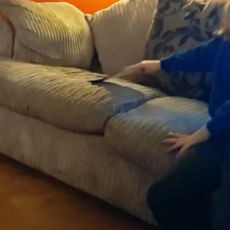 Hop on! |
 Fast & Furious |
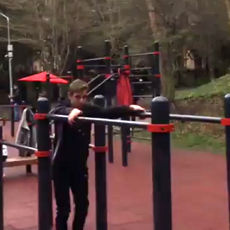 Parallel bars |
 You are killing it! |
You can also join the SRVIRAL TELEGRAM CHANNEL to see much more content.
ExtraBall
(Clicking on these links daily you support ALRNCN's work. They're collaborators or sponsors and, by visiting their sites, they like us even more)









|

|
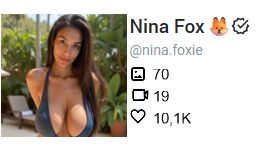
|

|

|

|
Published on 2026/02/23
TIK HOT VOL234
No one really knows the secret behind why a video turns into a trend. Or why, all of a sudden, thousands and thousands of people start copying it. Honestly, I don’t think anyone fully understands it. If there were a clear formula, the Internet would be a far more predictable place than it actually is.
What’s interesting is that some formats need very little to catch fire. Very little to start repeating, mutating, and eventually becoming part of the viral noise. And TikHot videos work exactly like that.
They don’t start from anything complicated. There’s no huge production or especially sophisticated concept behind them. Quite the opposite: they lean on dynamics that are already working on TikTok or Instagram. Dances, trends, recognizable gestures, small visual gags… the same stuff already floating around online, just with a tiny twist that changes everything.

# Watch videos
ExtraBall
We can do it too.

ExtraBall2
(Clicking on these links daily you support ALRNCN's work. They're collaborators or sponsors and, by visiting their sites, they like us even more)




TIK HOT VOL234
No one really knows the secret behind why a video turns into a trend. Or why, all of a sudden, thousands and thousands of people start copying it. Honestly, I don’t think anyone fully understands it. If there were a clear formula, the Internet would be a far more predictable place than it actually is.
What’s interesting is that some formats need very little to catch fire. Very little to start repeating, mutating, and eventually becoming part of the viral noise. And TikHot videos work exactly like that.
They don’t start from anything complicated. There’s no huge production or especially sophisticated concept behind them. Quite the opposite: they lean on dynamics that are already working on TikTok or Instagram. Dances, trends, recognizable gestures, small visual gags… the same stuff already floating around online, just with a tiny twist that changes everything.

# Watch videos
ExtraBall
We can do it too.

ExtraBall2
(Clicking on these links daily you support ALRNCN's work. They're collaborators or sponsors and, by visiting their sites, they like us even more)




Published on 2026/02/23
MACHINES WILL GO TO WAR FOR US
With the development of AI applied to the military field, something is starting to happen that feels familiar in the history of technological leaps. It happened with the atomic bomb. It happened with the space race. And now we’re seeing something similar with autonomous systems and combat robots.
More than a question of whether they’ll be used tomorrow or next year, what really exists is a race to be first. A quiet competition between powers trying to show they have the technology, that they can develop it, and that, if needed, they could deploy it. It’s not necessarily about an imminent war, but about sending a message: be careful with me, look at what I’m capable of.
In that context, artificial intelligence is speeding everything up. According to a report cited by Newsweek, defence analyst Francis Tusa warns it wouldn’t be surprising if China unveils battlefield-ready autonomous systems within just two years. The question is no longer only who has better weapons, but who manages to scale autonomy first — and what happens when machines begin making decisions faster than humans can.

The underlying logic is quite clear. One of the biggest brakes on large-scale conflict has always been human casualties. Military losses, civilian impact, and the political cost inside each country. Wars aren’t fought only on the battlefield; they’re also fought in public opinion.
But if the scenario changes and, instead of sending soldiers, you send machines, the political calculation shifts. The direct risk to the population drops, the perception of human cost weakens, and conflict can be framed as more acceptable — even justifiable — if the goal is influence, resources, or territory.
This doesn’t mean countries want to conquer the world tomorrow. But geopolitical ambition hasn’t disappeared, and technology has always been a tool to enable it. Military AI isn’t born only as a weapon, but also as a deterrent force. Just like nuclear arsenals, the mere fact of possessing it already reshapes the balance of power.
History has shown us that when a strategic technology appears, it quickly becomes part of the global chessboard. The difference now is speed. AI doesn’t evolve in decades — it evolves in months.

# Watch video
ExtraBall
Running the vacuum.
ExtraBall2
(Clicking on these links daily you support ALRNCN's work. They're collaborators or sponsors and, by visiting their sites, they like us even more)







MACHINES WILL GO TO WAR FOR US
With the development of AI applied to the military field, something is starting to happen that feels familiar in the history of technological leaps. It happened with the atomic bomb. It happened with the space race. And now we’re seeing something similar with autonomous systems and combat robots.
More than a question of whether they’ll be used tomorrow or next year, what really exists is a race to be first. A quiet competition between powers trying to show they have the technology, that they can develop it, and that, if needed, they could deploy it. It’s not necessarily about an imminent war, but about sending a message: be careful with me, look at what I’m capable of.
In that context, artificial intelligence is speeding everything up. According to a report cited by Newsweek, defence analyst Francis Tusa warns it wouldn’t be surprising if China unveils battlefield-ready autonomous systems within just two years. The question is no longer only who has better weapons, but who manages to scale autonomy first — and what happens when machines begin making decisions faster than humans can.

The underlying logic is quite clear. One of the biggest brakes on large-scale conflict has always been human casualties. Military losses, civilian impact, and the political cost inside each country. Wars aren’t fought only on the battlefield; they’re also fought in public opinion.
But if the scenario changes and, instead of sending soldiers, you send machines, the political calculation shifts. The direct risk to the population drops, the perception of human cost weakens, and conflict can be framed as more acceptable — even justifiable — if the goal is influence, resources, or territory.
This doesn’t mean countries want to conquer the world tomorrow. But geopolitical ambition hasn’t disappeared, and technology has always been a tool to enable it. Military AI isn’t born only as a weapon, but also as a deterrent force. Just like nuclear arsenals, the mere fact of possessing it already reshapes the balance of power.
History has shown us that when a strategic technology appears, it quickly becomes part of the global chessboard. The difference now is speed. AI doesn’t evolve in decades — it evolves in months.

# Watch video
ExtraBall
Running the vacuum.
ExtraBall2
(Clicking on these links daily you support ALRNCN's work. They're collaborators or sponsors and, by visiting their sites, they like us even more)







 CamBB.xxx
CamBB.xxxWe find the best live porn cams across many different cam sites like Streamate, Chaturbate, Cam4 and Stripchat.
 ChatSex.xxx
ChatSex.xxxWith Chat Sex you get free sex cams featuring nude cam girls you can chat with for free.
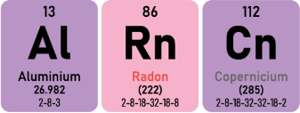














RECOMMENDED SITES
 Add your site
Add your site
- BoobieBlog
- Motherless
- celeb-stalker.com
- Erotic Beauties
- sweetlicious
- Kanoni Net
- Candid Teens
- Babes & Bitches
- Shocking Porn
 Add your site
Add your site💩 CrazyShit
🤪 eFukt
NudeChatGirls
👉🍑 Top XXX Pictures
Bingo Porno
Best Porn Blog Sites
 Sex Games
Sex Games
Real Amateur Porn
MrPornGeek
Comepollas
PornScn Free Porno
Stripcams
AI Girlfriend App
Hardcore Porn Videos
NSFW.Tools
Sex AI Chat
Porn Game
ShareAnyNudes
Teenager365
Naked AI

















Published on 2026/02/23
INSTAGRAM OF THE DAY: GIANNNAJ
Gianna Everhart
WVU alum
412🤍614
🇮🇹

# See photos
You can also follow us through our INSTAGRAM ACCOUNT
ExtraBall
Drawing in the snow.
ExtraBall2
(Clicking on these links daily you support ALRNCN's work. These are collaborations or sponsorships and, by visiting their sites, they like us even more)







INSTAGRAM OF THE DAY: GIANNNAJ
Gianna Everhart
WVU alum
412🤍614
🇮🇹

# See photos
You can also follow us through our INSTAGRAM ACCOUNT
ExtraBall
Drawing in the snow.
ExtraBall2
(Clicking on these links daily you support ALRNCN's work. These are collaborations or sponsorships and, by visiting their sites, they like us even more)







VISIT OUR STORE AND TREAT YOURSELF TO A GREAT GIFT. ONLY FOR 100% ALRNCN FANS.
Published on 2026/02/23
PUNCH, THE BABY MONKEY AND THE ENDING EVERYONE WANTS TO SEE
The name Punch has been everywhere this weekend. Social media, newspapers, TV… suddenly, a baby Japanese macaque from a zoo in Japan has become one of the most viral stories of the moment. And it’s not by chance.
Punch was born last summer and was rejected by his mother shortly after birth. Since then, zoo keepers have been raising him by hand, trying to replace the bond he never had. To help him cope, they gave him a stuffed toy that he uses as comfort, company, and almost as a mother figure. That image — a tiny monkey hugging a plush toy while trying to find his place — is what has traveled all around the world.
Videos showing him trying to interact with the other macaques, still unable to fully understand the group’s social codes, have touched something very basic in people. It doesn’t need much explanation: everyone understands what it feels like to be small, out of place, or unsure of where they belong. The Internet works like that. When a story connects with something universal, it spreads on its own.

And as usually happens in cases like this, the viral wave hasn’t stayed only in the emotional territory. The toy Punch carries has sold out in several countries, and shops and resellers are already trying to replicate it or release similar versions to ride the trend. The monkey’s story has gone from a touching scene to a full commercial phenomenon, once again proving how fast the Internet turns any symbol into a product.
Punch isn’t just a viral animal. He has become a small global narrative: fragility, rejection, survival… a real-life character with a story that’s easy to understand and easy to connect with, even if you know nothing about zoos or macaques.
And that’s where another phenomenon of our time steps in: AI.
Because artificial intelligence isn’t just useful for generating pretty images or curious clips. It allows us to turn into scenes the things we imagine when we see stories like this. It gives visual form to that version of the story we build in our heads when we want it to move forward, change, or reach a different ending.
Sometimes reality stops halfway. And sometimes technology shows up just in time to push it a little further.
# Watch videos
ExtraBall
Today’s slow-motion moment.
ExtraBall2
(Clicking on these links daily you support ALRNCN's work. They're collaborators or sponsors and, by visiting their sites, they like us even more)







PUNCH, THE BABY MONKEY AND THE ENDING EVERYONE WANTS TO SEE
The name Punch has been everywhere this weekend. Social media, newspapers, TV… suddenly, a baby Japanese macaque from a zoo in Japan has become one of the most viral stories of the moment. And it’s not by chance.
Punch was born last summer and was rejected by his mother shortly after birth. Since then, zoo keepers have been raising him by hand, trying to replace the bond he never had. To help him cope, they gave him a stuffed toy that he uses as comfort, company, and almost as a mother figure. That image — a tiny monkey hugging a plush toy while trying to find his place — is what has traveled all around the world.
Videos showing him trying to interact with the other macaques, still unable to fully understand the group’s social codes, have touched something very basic in people. It doesn’t need much explanation: everyone understands what it feels like to be small, out of place, or unsure of where they belong. The Internet works like that. When a story connects with something universal, it spreads on its own.

And as usually happens in cases like this, the viral wave hasn’t stayed only in the emotional territory. The toy Punch carries has sold out in several countries, and shops and resellers are already trying to replicate it or release similar versions to ride the trend. The monkey’s story has gone from a touching scene to a full commercial phenomenon, once again proving how fast the Internet turns any symbol into a product.
Punch isn’t just a viral animal. He has become a small global narrative: fragility, rejection, survival… a real-life character with a story that’s easy to understand and easy to connect with, even if you know nothing about zoos or macaques.
And that’s where another phenomenon of our time steps in: AI.
Because artificial intelligence isn’t just useful for generating pretty images or curious clips. It allows us to turn into scenes the things we imagine when we see stories like this. It gives visual form to that version of the story we build in our heads when we want it to move forward, change, or reach a different ending.
Sometimes reality stops halfway. And sometimes technology shows up just in time to push it a little further.
# Watch videos
ExtraBall
Today’s slow-motion moment.
ExtraBall2
(Clicking on these links daily you support ALRNCN's work. They're collaborators or sponsors and, by visiting their sites, they like us even more)








➡️ Let's do real, be real with Tantaly, the sex doll torso leader
Published on 2026/02/23
DON'T MISS WHAT THE INTERNET HAS IN STORE FOR US THIS WEEK
david
Good morning, ALRNCN friends. We’re kicking off a brand new week by firing up the engines, just like always, and they’ll be running at full throttle until Friday.
Stick with us for another week and discover what new surprises this wild, steamy, and endlessly entertaining Internet has in store for us.

# Watch videos
You can see live webcam shows on StripChat

You can also see more videos like this on our TELEGRAM CHANNEL
How to unlock adult content on Telegram (Apple, Android, or any device)
If you try to open our Channel and Telegram shows a warning about adult content and won’t let you in, it means the restriction filter is turned on.
Just go to https://web.telegram.org, log in, and open:
Settings → Privacy → Sensitive content
Turn on “Disable filtering” and you’re good to go.
The change syncs automatically with your Telegram app on any device.
ExtraBall
While your Mario game keeps gathering dust on the shelf, things are definitely happening in the Mushroom Kingdom.
ExtraBall2
(Clicking on these links daily you support ALRNCN's work. They're collaborators or sponsors and, by visiting their sites, they like us even more)




DON'T MISS WHAT THE INTERNET HAS IN STORE FOR US THIS WEEK
david
Good morning, ALRNCN friends. We’re kicking off a brand new week by firing up the engines, just like always, and they’ll be running at full throttle until Friday.
Stick with us for another week and discover what new surprises this wild, steamy, and endlessly entertaining Internet has in store for us.

# Watch videos
You can see live webcam shows on StripChat

You can also see more videos like this on our TELEGRAM CHANNEL
How to unlock adult content on Telegram (Apple, Android, or any device)
If you try to open our Channel and Telegram shows a warning about adult content and won’t let you in, it means the restriction filter is turned on.
Just go to https://web.telegram.org, log in, and open:
Settings → Privacy → Sensitive content
Turn on “Disable filtering” and you’re good to go.
The change syncs automatically with your Telegram app on any device.
ExtraBall
While your Mario game keeps gathering dust on the shelf, things are definitely happening in the Mushroom Kingdom.
ExtraBall2
(Clicking on these links daily you support ALRNCN's work. They're collaborators or sponsors and, by visiting their sites, they like us even more)





Contact
You can tell us whatever you want via email: [email protected]
If you prefer, you can use this contact form:
If you prefer, you can use this contact form:






Published on 2026/02/20
HOUSEHOLD CHORES VOL4
It’s Friday. Two days off ahead of us, Saturday and Sunday. Time to disconnect, go out, see friends, stop watching the clock… or at least try.
But then there’s the other reality: the weekend with pending chores.
Laundry piling up, dust on the furniture, the floor begging for a sweep, the groceries that won’t buy themselves, the meals for the week that someone has to prepare… That moment when you realize that if you don’t deal with it now, Monday will be worse.
It’s not exactly exciting, sure. But it doesn’t have to ruin your weekend either.
The key is not seeing it as a punishment, but as an investment. Spending a bit of time putting your place in order isn’t losing free time; it’s buying yourself peace of mind for the coming days. When your surroundings are clean and organized, everything flows better. You wake up with less stress, you find things without fighting with drawers, and even your head feels clearer.
In the end, a tidy home usually means a tidy mind. And yeah, it may sound like a cliché, but you feel it.
So do what needs to be done, but don’t dramatize it. Put on some music, knock it out in one go, get it over with… and then enjoy the weekend with that feeling that everything’s under control.
Because the weekend is also for resting without stuff buzzing around your head.

# Watch videos
 You can see much more content like this on our TELEGRAM CHANNEL
You can see much more content like this on our TELEGRAM CHANNEL
How to unlock adult content on Telegram (Apple, Android, or any device)
If you try to open our Channel and Telegram shows a warning about adult content and won’t let you in, it means the restriction filter is turned on.
Just go to https://web.telegram.org, log in, and open:
Settings → Privacy → Sensitive content
Turn on “Disable filtering” and you’re good to go.
The change syncs automatically with your Telegram app on any device.
ExtraBall
Bonus Stage: Car Crush.
Full video
She is AJ Applegate and in this link you can watch several of her scenes
You win!
ExtraBall2
(Clicking on these links daily you support ALRNCN's work. They're collaborators or sponsors and, by visiting their sites, they like us even more)







HOUSEHOLD CHORES VOL4
It’s Friday. Two days off ahead of us, Saturday and Sunday. Time to disconnect, go out, see friends, stop watching the clock… or at least try.
But then there’s the other reality: the weekend with pending chores.
Laundry piling up, dust on the furniture, the floor begging for a sweep, the groceries that won’t buy themselves, the meals for the week that someone has to prepare… That moment when you realize that if you don’t deal with it now, Monday will be worse.
It’s not exactly exciting, sure. But it doesn’t have to ruin your weekend either.
The key is not seeing it as a punishment, but as an investment. Spending a bit of time putting your place in order isn’t losing free time; it’s buying yourself peace of mind for the coming days. When your surroundings are clean and organized, everything flows better. You wake up with less stress, you find things without fighting with drawers, and even your head feels clearer.
In the end, a tidy home usually means a tidy mind. And yeah, it may sound like a cliché, but you feel it.
So do what needs to be done, but don’t dramatize it. Put on some music, knock it out in one go, get it over with… and then enjoy the weekend with that feeling that everything’s under control.
Because the weekend is also for resting without stuff buzzing around your head.

# Watch videos
How to unlock adult content on Telegram (Apple, Android, or any device)
If you try to open our Channel and Telegram shows a warning about adult content and won’t let you in, it means the restriction filter is turned on.
Just go to https://web.telegram.org, log in, and open:
Settings → Privacy → Sensitive content
Turn on “Disable filtering” and you’re good to go.
The change syncs automatically with your Telegram app on any device.
ExtraBall
Bonus Stage: Car Crush.
Full video
She is AJ Applegate and in this link you can watch several of her scenes
You win!
ExtraBall2
(Clicking on these links daily you support ALRNCN's work. They're collaborators or sponsors and, by visiting their sites, they like us even more)







Published on 2026/02/20
SRVIRAL #2168
Gearshift
You can see many more videos, curiosities and silly stuff visiting srviral.com
You can also join the SRVIRAL TELEGRAM CHANNEL to see much more content.
ExtraBall
(Clicking on these links daily you support ALRNCN's work. They're collaborators or sponsors and, by visiting their sites, they like us even more)







SRVIRAL #2168
Gearshift
 Quad |
 Helping dad |
 Tree going down! |
 No hands |
 Piñata |
 I want the gold |
 Chameleon |
 Living in a drawing |
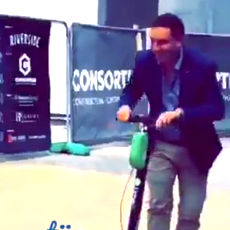 Freestyle |
You can also join the SRVIRAL TELEGRAM CHANNEL to see much more content.
ExtraBall
(Clicking on these links daily you support ALRNCN's work. They're collaborators or sponsors and, by visiting their sites, they like us even more)







Published on 2026/02/20
WARS OF THE FUTURE
There’s a video going around on social media that, if nobody told you anything, could easily pass as real. It looks like a military training exercise: a line of soldiers advancing with machine guns, running while firing, crossing obstacles, climbing trenches… the kind of thing you’d expect from a tactical drill. The difference is they aren’t soldiers. They’re robots.
More specifically, robots similar to the Unitree G1, those Chinese humanoids we’ve been seeing for months doing parkour, boxing, getting up from the ground and moving with a naturalness that barely feels like science fiction anymore. In the video they move in formation, fire, take cover… and even though it’s obvious the footage is generated with artificial intelligence, what’s unsettling is how believable it looks.
And of course, it inevitably makes you think about the wars of the future.

The idea itself isn’t new: sending machines instead of people to the front lines. Robots remotely controlled from simulators, autonomous androids with a programmed mission, or hybrid systems where AI makes tactical decisions in real time. For any country, that would be the ideal scenario: fewer human casualties, less internal pressure, and a war fought with hardware instead of lives.
The problem is the enemy would have the same thing.
If that scenario ever arrives, wars could turn into clashes of robots versus robots. Mechanical armies advancing, firing, taking positions… until one side loses its technological edge and has no choice but to surrender. Not because of direct human defeat, but because it’s been outmatched in power, control, and machine production.
It sounds very futuristic, sure. But you don’t have to look that far ahead to see where things are heading.
In Ukraine, for example, we’re already seeing how drones have become a key part of the conflict. Some of them even use fiber-optic cables to communicate, precisely because radio signals are relatively easy to jam or block through electronic warfare. Technology moves forward, but the weaknesses are still there.
And the same would apply to robot armies.
Batteries, communications, sensors… all of it can fail. An electromagnetic pulse, electronic sabotage, or simple energy limitations could disable an entire unit without a single shot being fired. Right now, building a fully autonomous combat-ready android army is still quite far off.
But twenty years ago, the idea of drones making real-time targeting decisions also sounded distant — and now it’s part of reality.
So even if the video is fiction, the reflection isn’t.
War always evolves alongside technology, and the real question isn’t whether we’ll see machines fighting for nations… but when it will start to feel normal.

# Watch video
ExtraBall
— Hey… remember us? — Want us to suck it? — Want me to suck it? — Want a blowjob? — Just the tip. — Want it? — Want it? — Come on, do it. — You’ll like it. — Want it? — Come on.
 instagram.com/voidstomper
instagram.com/voidstomper

ExtraBall2
(Clicking on these links daily you support ALRNCN's work. They're collaborators or sponsors and, by visiting their sites, they like us even more)




WARS OF THE FUTURE
There’s a video going around on social media that, if nobody told you anything, could easily pass as real. It looks like a military training exercise: a line of soldiers advancing with machine guns, running while firing, crossing obstacles, climbing trenches… the kind of thing you’d expect from a tactical drill. The difference is they aren’t soldiers. They’re robots.
More specifically, robots similar to the Unitree G1, those Chinese humanoids we’ve been seeing for months doing parkour, boxing, getting up from the ground and moving with a naturalness that barely feels like science fiction anymore. In the video they move in formation, fire, take cover… and even though it’s obvious the footage is generated with artificial intelligence, what’s unsettling is how believable it looks.
And of course, it inevitably makes you think about the wars of the future.

The idea itself isn’t new: sending machines instead of people to the front lines. Robots remotely controlled from simulators, autonomous androids with a programmed mission, or hybrid systems where AI makes tactical decisions in real time. For any country, that would be the ideal scenario: fewer human casualties, less internal pressure, and a war fought with hardware instead of lives.
The problem is the enemy would have the same thing.
If that scenario ever arrives, wars could turn into clashes of robots versus robots. Mechanical armies advancing, firing, taking positions… until one side loses its technological edge and has no choice but to surrender. Not because of direct human defeat, but because it’s been outmatched in power, control, and machine production.
It sounds very futuristic, sure. But you don’t have to look that far ahead to see where things are heading.
In Ukraine, for example, we’re already seeing how drones have become a key part of the conflict. Some of them even use fiber-optic cables to communicate, precisely because radio signals are relatively easy to jam or block through electronic warfare. Technology moves forward, but the weaknesses are still there.
And the same would apply to robot armies.
Batteries, communications, sensors… all of it can fail. An electromagnetic pulse, electronic sabotage, or simple energy limitations could disable an entire unit without a single shot being fired. Right now, building a fully autonomous combat-ready android army is still quite far off.
But twenty years ago, the idea of drones making real-time targeting decisions also sounded distant — and now it’s part of reality.
So even if the video is fiction, the reflection isn’t.
War always evolves alongside technology, and the real question isn’t whether we’ll see machines fighting for nations… but when it will start to feel normal.

# Watch video
ExtraBall
— Hey… remember us? — Want us to suck it? — Want me to suck it? — Want a blowjob? — Just the tip. — Want it? — Want it? — Come on, do it. — You’ll like it. — Want it? — Come on.

ExtraBall2
(Clicking on these links daily you support ALRNCN's work. They're collaborators or sponsors and, by visiting their sites, they like us even more)
























